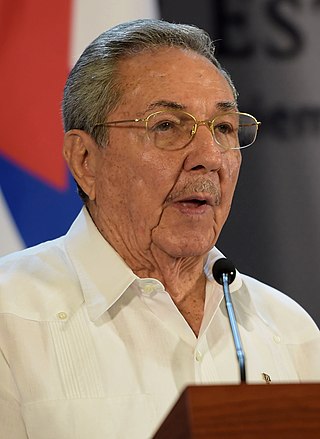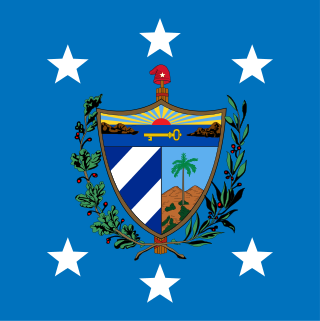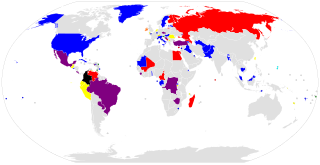
The Organization of American States is an international organization founded on 30 April 1948 to promote cooperation among its member states within the Americas.

Cuba has had a socialist political system since 1961 based on the "one state – one party" principle. Cuba is constitutionally defined as a single party Marxist–Leninist socialist republic with semi-presidential powers. The present Constitution of Cuba, which was passed in a 2019 referendum, also describes the role of the Communist Party of Cuba to be the "leading force of society and of the state" and as having the capability of setting national policy, and First Secretary of the Communist Party is the most powerful position in Cuba. The 2019 Constitution of Cuba identifies the ideals represented by Cuban independence hero José Martí and revolutionary leader Fidel Castro as the primary foundation of Cuba's political system, while also stressing the importance of the influence of the ideas of Marx, Engels, and Lenin.

Raúl Modesto Castro Ruz is a Cuban retired politician and general who served as the first secretary of the Communist Party of Cuba, the most senior position in the one-party communist state, from 2011 to 2021, and President of Cuba between 2008 and 2018, succeeding his brother Fidel Castro.

The president of Cuba, officially the president of the Republic of Cuba, is the head of state of Cuba. The office in its current form was established under the Constitution of 2019. The President is the second-highest office in Cuba and the highest state office. Miguel Díaz-Canel became President of the Council of State on 19 April 2018, taking over from Raúl Castro, and has been President of Cuba since 10 October 2019.

Even before attaining its independence from Spain, Cuba had several constitutions either proposed or adopted by insurgents as governing documents for territory they controlled during their war against Spain. Cuba has had several constitutions since winning its independence. The first constitution since the Cuban Revolution was drafted in 1976 and has since been amended. In 2018, Cuba became engaged in a major revision of its constitution. The current constitution was then enacted in 2019.

Elections in Cuba are held at the municipal, provincial, and national levels. Cuba is a one-party state, with the Communist Party of Cuba being described as the "superior driving force of the society and the state" in the Constitution of Cuba. Because the communist party is the only official political party, elections in Cuba are not considered democratic because the government does not allow free and fair voting.

Iris Xiomara Castro Sarmiento, also known as Xiomara Castro de Zelaya, is a Honduran politician and businesswoman who has served as the 39th president of Honduras since January 2022. She is the country's first female president, and served as first lady during the presidency of her husband Manuel Zelaya.

Vilma Lucila Espín Guillois was a Cuban revolutionary, feminist, and chemical engineer. She helped supply and organize the 26th of July Movement as an underground spy, and took an active role in many branches of the Cuban government from the conclusion of the revolution to her death. Espín helped found the Federation of Cuban Women and promoted equal rights for Cuban women in all spheres of life.

Constituent Assembly elections were held in Ecuador on 30 September 2007. A Constituent Assembly was established following an April referendum on doing so. A total of 130 delegates were elected; 24 members from national lists, 100 elected from provincial constituencies and six for overseas votes.
The Ecuadorian Constituent Assembly was a 2007–2008 constitutional assembly in Ecuador, which drafted the 2008 Constitution of Ecuador, approved via the Ecuadorian constitutional referendum, 2008.
Parliamentary elections were held in Cuba on 20 January 2008 to elect members of the National Assembly of People's Power. According to the Cuban electoral system, one candidate was nominated for each of the 614 seats in the Assembly, and candidates were elected if they received at least 50% of the vote. The candidates are otherwise proposed by nominating assemblies, which comprise representatives of workers, youth, women, students and farmers as well as members of the Committees for the Defense of the Revolution, after initial mass meetings soliciting a first list of names. The final list of candidates is drawn up by the National Candidature Commission taking into account criteria such as candidates' merit, patriotism, ethical values and revolutionary history.

José Ramón Machado Ventura is a Cuban revolutionary and politician who was the First Vice President of the Council of State of Cuba from 2008 to 2013. With the election of Raúl Castro as President of Cuba on 24 February 2008, Machado was elected to succeed him as First Vice President, serving until 2013. He was elected Second Secretary of the Communist Party of Cuba in 2011.
Cuban-Pacific relations are diplomatic, economic, cultural, and other relations between the Cuba and countries situated in Oceania. In the 2000s, Cuba has been strengthening its relations with Pacific nations, which have, for the most part, responded favorably to Cuban medical aid in particular. The first Cuba-Pacific Islands ministerial meeting was held in September 2008 in Havana, with government members from ten Pacific countries—Kiribati, Tuvalu, Nauru, Solomon Islands, Fiji, Tonga, Vanuatu, Samoa, the Federated States of Micronesia and Papua New Guinea—attending. The meeting was a consolidation rather than a starting point of Cuban-Pacific relations.

Miguel Díaz-Canel Bermúdez is a Cuban politician and engineer. He has served as the 8th First Secretary of the Communist Party of Cuba since 2021 and as the 17th President of Cuba since 2019. In his capacity as First Secretary he is the most powerful person in the Cuban government.

This national electoral calendar for 2018 lists the national/federal elections held in 2018 in all sovereign states and their dependent territories. By-elections are excluded, though national referendums are included.

Parliamentary elections were held in Cuba on 26 March 2023 to elect members of the National Assembly of People's Power.

A constitutional referendum was held in Cuba on 24 February 2019. Voters were asked whether they approved of a new constitution passed by the National Assembly of People's Power in July 2018. The reforms were approved, with 90.61% of valid votes cast in favour. The new constitution came into force on 10 April 2019 after it was proclaimed in the Cuban National Assembly and published in the Official Gazette of the Republic.

Nuevas Ideas is the ruling political party of El Salvador. The party was founded on 25 October 2017 by Nayib Bukele, the then-mayor of San Salvador, and was registered by the Supreme Electoral Court on 21 August 2018. The party's current president is Xavier Zablah Bukele, a cousin of Bukele who has served since March 2020.

General elections were held in El Salvador in February and March 2024. In the first round on 4 February, voters elected the president, vice president, and all 60 deputies of the Legislative Assembly. In the second round on 3 March, voters elected mayors and municipal councils for all 44 of the country's municipalities and all 20 of El Salvador's deputies to the Central American Parliament (PARLACEN).

This national electoral calendar for 2023 lists the national/federal elections held in 2023 in all sovereign states and their dependent territories. By-elections are excluded, though national referendums are included.













